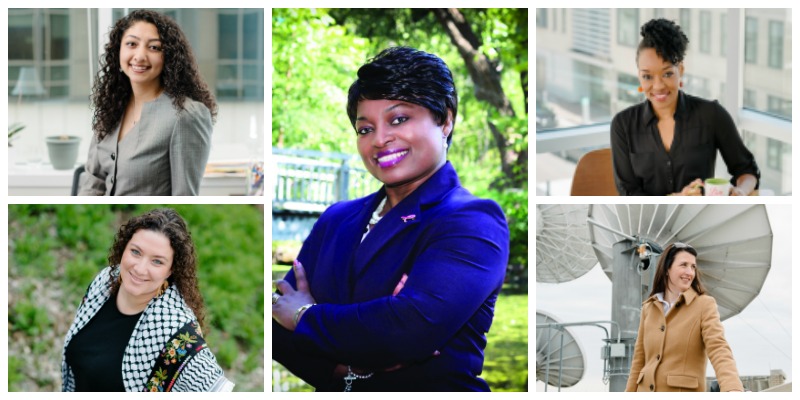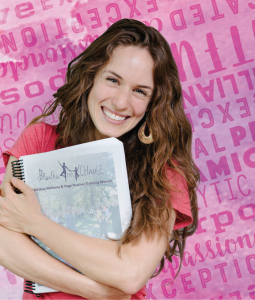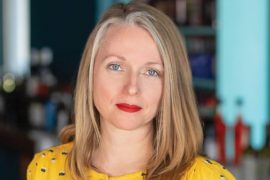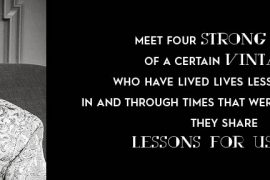LOCAL WOMEN
GLOBAL IMPACTMeet five visionaries, inspirations and advocates who are making a difference and weaving connections between Madison and the world.
WEAVING THE FABRIC OF A GLOBAL CITIZEN
Emilie Ngo-Nguidjol Songolo’s smile is as bright as the African fabrics she’s showing off at UW-Madison Memorial Library. For 30 years, she’s been collecting these colorful textiles with large patterns—florals, landscapes, animals, portraits, all telling important stories.
“I’m particularly interested in fabrics that carry the voices of women,” says Songolo, who has been a voice for women and many others through her UW library work and as founder and director of AFRICaide, a nonprofit that strives to reduce abject poverty in Africa.
Born in the central African country of Cameroon, Songolo credits her parents for empowering her to empower others. Her mother was a community leader and her father, a feminist. “He was avantgarde,” she says. “Everything people wanted for their sons, he wanted that for his daughters. The way I grew up made me entrepreneurial and creative.”
After college in Cameroon, she took a fellowship at Mount Holyoke College for women from developing countries then made her way to UC Los Angeles for a library degree before landing in Madison for her husband’s work in 1991, when she started working as a UW-Madison librarian.
As subject specialist for African, global and Francophone studies, Songolo travels the world for meetings and to scour for books—and textiles—to bolster UW collections. She’s gathered fabric commemorating events and individuals of historical, political, religious, economic, educational and sociological significance to African societies.
“Fabrics are a way to communicate,” she says. “There are many people who don’t know how to read or write, but fabrics can convey messages to them.” She shares large swaths representing holidays, people and causes: for example, a mother nursing a child to promote health. Thanks to Songolo, the fabrics have found a home online, archived in the UW African Studies Collection.
In 2005, Songolo started AFRICaide to honor her brother, an avid philanthropist killed in a car crash. The organization empowers women and girls who are victims of rape, but also men and small communities, in Cameroon and the Democratic Republic of Congo. AFRICaide focuses on healthcare, food security and education— from providing funds for a motorcycle to transport people to faraway hospitals to improving school facilities. She aims to deliver dignity in the face of poverty. “When people find themselves in certain conditions, it doesn’t mean that they are less human,” she says. “It’s merely happenstance that I have this life. I want to use it in service to others.”
Her global work inspires local action, too. “When I travel the world and meet people from other countries,” Songolo says, “it helps me take a better look at Madison.” She’s been recognized locally with awards from UW-Madison and the Wisconsin Women of Color Network. “I have always been a global citizen. My immediate environment is Madison but I love connecting and supporting people from all over the world.”
CHANGING LIVES IN LIBERIA
Knocking on one door in Liberia changed Shoana Cachelle’s life, and in turn the lives of hundreds she’s supported in her native country.
The door belonged to Africa’s first elected female head of state, Ellen Johnson Sirleaf. Cachelle, on a daring whim, stopped at her house to ask if she could photograph Sirleaf, who then hired Cachelle for official photography and beckoned her home to help rebuild the country.
Born in Liberia, Cachelle and her family left in 1999 due to a civil war that killed more than 600,000 people. Cachelle didn’t return until 2005, but since then, she’s split her time between Madison and Liberia, where she started a school, a creative arts center, a natural hair salon, a guesthouse and her advertising and marketing firm. Everything is housed in her family’s compound in the capital of Monrovia, where she grew up.
She opened the Cachelle International Creative Arts Center in 2012 to enhance the lives of children through dance, music, drama and art. More than 900 kids and young adults have found purpose and inspiration at her classes and summer camps. Cachelle shares a story of one girl who spends her free time taking care of siblings and doing housework, adding, “This girl loves the Center because it’s where she can go to be a child. That story is why I do what I do.”
Cachelle puts her business acumen to work in both Liberia and Madison. Through her marketing firm, Cachelle International, she helps businesses here and abroad use social media to create campaigns and build brands. Her natural hair salon in Liberia allows young women to acquire a trade and earning power, a challenge in a country that values educating men over women. She’s also opened a natural hair salon in Madison. And, she shares stories of inspiration and change— from her own life, and in her series “Her Story,” from the lives of interesting local women—on her YouTube channel.
Cachelle lived full time in Liberia from 2009 to 2014 with her husband and children, one of them adopted from Liberia. They left in 2014 due to the Ebola outbreak. When they settled in Madison, her adopted daughter was bullied at school. So Cachelle launched a campaign to stop the stigmatization of Africans. She and others across the world took pictures and video of themselves holding signs that said, “I am Liberian, not a virus.” The images went viral on Facebook—shared by celebrities—and helped bring more aid to countries affected by Ebola.
“Going back and forth between Madison and Liberia is challenging,” she says, “especially leaving my family behind. But I just have to keep going.” In a video, she adds: “I believe my calling is to transform lives. We need more people to teach, give and empower.”
IMMIGRATION ATTORNEY/ADVOCATE
After President Donald Trump issued his order in January banning travel to the U.S. by seven mostly Muslim countries, Shabnam Lotfi “felt this enormous feeling of ‘This cannot be happening’.” An immigration attorney, she immediately invited people to her house where they penned letters, contacted congressional representatives and created a Facebook group called Immigrants United.
Within a week, the group had nearly 10,000 members.
Having lobbied Congress for immigration reform, Lotfi works with clients here and around the globe on family- and employment-based immigration services, including visas, green cards, waivers and citizenship cases.
Trump’s order changed her daily practice. “I used to be 50 percent advocate and 50 percent attorney. Now, I’m 100 percent each. It’s tense,” she says, “but what I feel is nothing compared to what many immigrants are going through across the country and around the world.”
An Iranian-American, Lotfi came to the U.S. on a green card with her family when she was 4. They were fleeing the 1980s Iran-Iraq war, which caused food scarcity and bombings that shook her childhood home. When Lotfi became a U.S. citizen at age 10, she’d lived in seven houses on three continents. “Being an immigrant, moving is a way of life,” she says. Lotfi got a law degree from UW-Madison and intended to go into public service, but she started fielding immigration questions from family and friends. “Friends told their friends, and suddenly I was getting calls from Oklahoma and Tokyo and Switzerland,” she says. “Immigration law picked me.”
She’s become a local—and international—spokesperson on immigration issues, heard on media from Madison’s WORT 89.9 FM to Al Jazeera. She also started the Madison Immigration Lawyers group.
Lotfi’s active Facebook page helps immigrants navigate a treacherous political landscape and in many cases, reunite with family. For example, when the courts issued a restraining order against the travel ban in early February, Lufthansa airline said it would allow passengers from the seven banned countries to board flights to Boston during a short window. Her page alerted people around the world to buy tickets. In another instance, Lotfi worked with Facebook members to put pressure on the U.S. Embassy in Yerevan, Armenia, which resulted in resolving visa issues.
Lotfi’s legal advice and advocacy are peppered with a surprising dose of optimism. She shares information as well as comfort and encouragement to clients and Facebook followers. In one Immigrants United video she said, “You have proven you are resilient. Continue to go after your dreams. The world needs you.”
GIVING CHILDREN A PLAY SPACE IN PALESTINE
Just a few streets away from the Church of the Nativity in Bethlehem, a historic villa will soon house Palestine’s first children’s museum—inspired by the Madison Children’s Museum and spearheaded by Layla Kaiksow.
“This museum is my baby,” says Kaiksow, who has two children and just last year moved back to Madison from Palestine, where she’d lived for more than a decade. “I would take my kids to the children’s museum here and think, ‘We need something like this in Bethlehem.’ Those kids have so little.”
Kaiksow has spent years making the museum a reality—fundraising; partnering with a Palestinian cultural heritage center; working with artists, architects, teachers and mothers; and bringing a consultant from Madison Children’s Museum to Palestine. The museum will focus on Palestinian heritage and history, sustainability and the environment and the arts, for kids up to age 12. Kaiksow has placed the project in local hands but still serves as a mentor.
“There’s so much negative press about Palestine and Arabs. I just wanted to give children there something they can be proud of,” she says. Exhibits will feature Palestinian embroidery and exhibits on the Arab world’s contributions to math and science.
An Arab-American, Kaiksow spent her childhood visiting her father in Bahrain, an island nation between Saudi Arabia and Qatar. Her husband is Palestinian. Kaiksow’s global education and career have spanned countries and organizations, including the United Nations and an international agency advocating for children’s rights. She started the first fair trade association in Palestine to help olive farmers export high quality olive oil. “Fair trade and solidarity markets are the only markets they can use. The Palestinian’s economic situation can really paralyze them,” she says.
She and her family moved back to Madison in December 2015. “It was a very dramatic exit,” she says. “There was a lot of violence. We would be eating dinner and suddenly there’d be tear gas in our living room.”
Here, Kaiksow is on the board for Working Capital for Community Needs. She’s also active with Open Doors for Refugees and a sister city project with Rafah, Palestine. Open Doors was formed by volunteers in response to the Syrian refugee crisis to fill service gaps in local resettlement programs. “I love how this community has pulled together to support refugees,” she says.
Kaiksow will take a trip this summer to see the new children’s museum in Palestine. “For me,” she says, “it will always be very important to stay connected abroad.”
SUPPORTING WOMEN SCIENTISTS, SHARING IMPACTFUL SCIENCE
Tracey Holloway didn’t plan on being a scientist. Many women, she says, don’t. Now a UW-Madison professor and researcher, Holloway has spent 15 years supporting women scientists across the globe in the organization she founded—the Earth Science Women’s Network.
From Holloway and five colleagues in 2002, the nonprofit group has grown to 3,000 women in 60 countries and is the largest organization of women in earth sciences, with members at every major university around the world.
She started the network to address common work-life balance issues that were “too profession-related to ask your mom and too personal to ask your boss,” such as weighing world travel and family life. “These are personal questions but also pivotal to your career,” she says.
The network’s impact is felt around the world. Holloway shares the story of a German woman who considered leaving her profession after just finishing her Ph.D. But she joined the network and now leads a major research group in Germany. Back in the States, the Women’s Network helped create a place for pumping breast milk at a large conference in San Francisco that hosts scientists from around the globe. “This might seem like a small barrier, but things like this push women off the path of science,” she says.
Holloway says the Women’s Network is slated to grow with a new endowment at the Madison Community Foundation.
In her research, Holloway leads an air quality and health team through UW-Madison and NASA. Results have found that around the world, air pollution is changing as a function of economic growth, energy use and investments in clean air. “The U.S. has gotten cleaner [since the 1970 Clean Air Act], and you can see that from space,” she says. “We’ve shown that we can grow our economy and energy use and still have clean air. We can always do better, but it’s really an optimistic story,” adding that other countries can adopt U.S. policies “off the shelf” to improve air quality.
“My passion really is making the world a better place,” she says. “My way to do that is to get science in the hands of people who can make a difference across the world and to support and get more women in science.”




